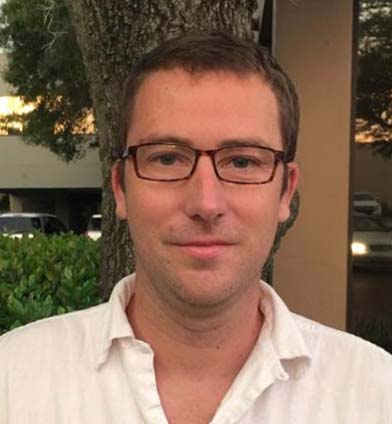

KENNESAW, Ga. | Aug 27, 2020

Kennesaw State University professor Nicolas Douguet has been awarded a $138,000 grant from the National Science Foundation (NSF) to study molecules subject to intense and ultra-fast laser fields.
“I’m excited about this funding on multiple levels,” said Douguet, assistant professor of physics who has previously served as a collaborator and co-principal investigator on other grant awards. “First, the theoretical and computational techniques we are developing will be used to expand knowledge in a very promising area of physics, and it will provide opportunities for undergraduate research at KSU. Second, it is personally gratifying because this marks the first time that I have received a grant as the primary investigator.”
Laser physics is an emerging field, in that the Nobel Prize in Physics was recently awarded for a project that involved generating high-intensity, ultra-short optical pulses. Douguet’s research focuses on strong-field and attosecond physics, where very short laser bursts can serve as a high-speed camera to study the internal dynamics of fast-moving electrons in molecules on its natural (attosecond) time scale. To give a sense of how fast these processes occur, one attosecond is to one second as one second is to the age of the universe. With such fast lasers, electron movies measure the time an electron takes to tunnel through a quantum barrier, or trigger charge migration and bond formation in biomolecules. Ultimately, the goal of this field is to control specific chemical reactions with potential applications in biophysics and medicine.
“I would say attosecond physics is still in the infant stage”, he said. “We’re now focused on the fundamental aspects and what we can learn with this new generation of lasers. There are already some nice applications and demonstrations of the principles of control of some physical process in atoms and molecules. It’s very exciting to be involved with this field at this stage.”
Douguet will use KSU’s High-Performance Computing Cluster supercomputer along with the resources of the Extreme Science and Engineering Discovery Environment (XSEDE) for which he shares another grant to use supercomputers at various U.S. universities.
“You can imagine that analyzing the motion of many electrons in complex molecules interacting with a strong electromagnetic field is very difficult and requires the use of very powerful computers,” Douguet said.
Douguet also said he plans to use part of the funding for student researchers. He said he’d like to involve students each semester, including summers. He would also like to take students to at least one conference a year through the grant. The three-year grant began on August 1.
– Dave Shelles
Photos submitted
A leader in innovative teaching and learning, Kennesaw State University offers undergraduate, graduate, and doctoral degrees to its more than 51,000 students. Kennesaw State is a member of the University System of Georgia with 11 academic colleges. The university's vibrant campus culture, diverse population, strong global ties, and entrepreneurial spirit draw students from throughout the country and the world. Kennesaw State is a Carnegie-designated doctoral research institution (R2), placing it among an elite group of only 8 percent of U.S. colleges and universities with an R1 or R2 status. For more information, visit kennesaw.edu.